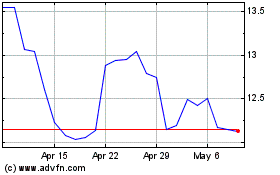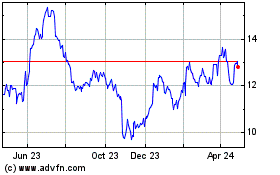Ford Rolls Out Business Services Unit, Plans Autonomous-Car Services--2nd Update
September 14 2016 - 11:22AM
Dow Jones News
By Christina Rogers
Ford Motor Co. made its latest plea for investors to view the
auto maker more like a Silicon Valley company, promising lofty
returns on future product ventures while warning that short-term
profits will be pinched by deep investment.
The Dearborn, Mich., auto maker told investors Wednesday that
its new business services unit will eventually deliver 20% margins,
two-and-a-half-times bigger than profits in its core auto-making
unit. It updated its plans for venturing into robo-taxi fleets,
electric vehicles and other transportation services like bike
sharing and shuttle vans.
Ford's share price has declined while Mark Fields has been at
the helm, even as the company notched record operating profits. The
focus under Mr. Fields -- who took over in 2014 after Alan Mulally
spent nearly a decade on initiatives that had Ford getting back to
basics -- has been on winning a technological arms race with rivals
including General Motors Co. and Toyota Motor Corp.
The strategy will be costly and risky.
Ford on Wednesday said profit will shrink in 2017 due to
investments, but will rebound in 2018 amid an expansion of its car
and truck lineup and $3 billion in annual cost cuts in a three-year
span beginning in 2016. It warned in recent months that this year's
financial performance will be affected by a safety recall, costs
related to Brexit and a slowdown in the U.S. market.
Mr. Fields is scrambling to catch up with Uber Technologies
Inc., Google Inc., Tesla Motors Inc. and other nontraditional auto
companies that have lapped Ford in electric-vehicle development,
autonomous-vehicle testing and services allowing customers to share
rides or cars.
The company has announced a flurry of partnerships and
investments this year, reflecting the company's frenzy 15 years ago
during the dot-com bubble to develop a slate of new business
ventures and acquire luxury and electric-car brands.
Those initiatives drained Ford's coffers and most didn't pan
out. Mr. Mullaly spent several years unwinding that strategy and
shoring up Ford's finances.
"The world is moving from simply owning vehicles to owning and
sharing them," Mr. Fields said. "That's why we are expanding to
sell more vehicles and more transportation services at the same
time."
Ford didn't put a timetable on its lofty 20% margin target for
new initiatives, which compares with a forecast of 8% margins in
the core operation selling trucks, sport utilities and cars in
markets all over the world.
The company thinks autonomous vehicles account for up 20% of
total vehicle sales by the end of the next decade, and the first
deployments will be in urban areas, such as New York City and Metro
Detroit.
Ford plans to roll out its first fully autonomous car with no
steering wheel or pedals in 2021, but only for commercial purposes.
A personal-use driverless car will be available in dealerships
around the middle of next decade, Mr. Fields said.
Tests of these types of vehicles indicate auto engineers still
have a long way to go in making autonomous vehicles behave in a way
that reflects real-world driving patterns.
Ford's recent string of announcements, which include the
purchase of a van-shuttle service in San Francisco and taking a
stake in laser-sensor maker Velodyne Inc., have done little to
soften Wall Street concerns about a cool-down in the U.S. market.
Ford's stock is down 11% since the start of 2016 despite the
success of the F-150 pickup truck and the coming launch of F-series
heavy-duty trucks, which are among the most profitable vehicles
sold in the world.
Ford says it total operating cash flow will remain positive
through 2018 and the company expects financial results to improve
in troubled Russia and South America as its restructuring efforts
take hold there.
Ford Chairman Bill Ford Jr., speaking to reporters earlier in
the week, said the company has an advantage with 113 years of
car-making experience, and Ford is examining its role in the
industry's evolution.
"That conversation has really shifted in the last year," Mr.
Ford said, adding that tech firms are starting to realize building
a car is no easy feat.
"People from the outside looking in really underestimated what
we brought to the table, particularly in terms of technology," Mr.
Ford said.
Write to Christina Rogers at christina.rogers@wsj.com
(END) Dow Jones Newswires
September 14, 2016 11:07 ET (15:07 GMT)
Copyright (c) 2016 Dow Jones & Company, Inc.
Ford Motor (NYSE:F)
Historical Stock Chart
From Mar 2024 to Apr 2024

Ford Motor (NYSE:F)
Historical Stock Chart
From Apr 2023 to Apr 2024
